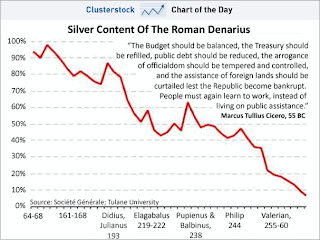This makes some sharp and good points.
I will try to respond to this and some other points in other posts over the next few days. Thanks.
Jay Raskin
Bernard Muller wrote:Hi Jay,
According to that article (http://mises.org/daily/3663) dated 2009, from Joseph R. Peden, who taught history at Baruch College of the City University of New York. (a rather enigmatic fellow involved in anarcho-capitalism), the dinarius in the time of Diocletian (284 to 305) was almost worthless, at best a small fraction of its value during Paul's public life. Reminder: the costs of travelling from ORBIS are calculated from data during Diocletian's reign, not during Claudius & Nero's ones (about 250 years earlier).
Here is the relevant part of the article, with some comments (in []) and bolding of mine.If you search on "inflation Roman empire" on Google, there are more websites on the topic but not as detailed.The basic coinage of the Roman Empire to this time — we're speaking now about 211 AD — was the silver denarius introduced by Augustus at about 95 percent silver at the end of the 1st century BC. The denarius continued for the better part of two centuries as the basic medium of exchange in the empire.
By the time of Trajan in 117 AD, the denarius was only about 85 percent silver, down from Augustus's 95 percent. By the age of Marcus Aurelius, in 180, it was down to about 75 percent silver. In Septimius's time it had dropped to 60 percent, and Caracalla evened it off at 50/50.
Caracalla was assassinated in 217. There then followed an age that historians refer to as the Age of the Barrack Emperors, because throughout the 3rd century all the emperors were soldiers and all of them came to their power by military coups of one sort or another.
There were about 26 legitimate emperors in this century and only one of them died a natural death. The rest either died in battle or were assassinated, which was totally unprecedented in Roman history — with two exceptions: Nero, a suicide, and Caligula, assassinated earlier.[What about Galba, Otho, Vitellius, Domitian, Commodus?]
Caracalla had also debased the gold coinage. Under Augustus this circulated at 45 coins to a pound of gold. Caracalla made it 50 to a pound of gold. Within 20 years after him it was circulating at 72 to a pound of gold, reduced to 60 at the end of the century by Diocletian, only to be raised again to 72 by Constantine. So even the gold coinage was in fact inflated — debased.
But the real crisis came after Caracalla, between 258 and 275, in a period of intense civil war and foreign invasions. The emperors simply abandoned, for all practical purposes, a silver coinage. By 268 there was only 0.5 percent silver in the denarius.
Prices in this period rose in most parts of the empire by nearly 1,000 percent. The only people who were getting paid in gold were the barbarian troops hired by the emperors. The barbarians were so barbarous [smart would be a more adequate word] that they would only accept gold in payment for their services.
The situation did not change until the accession of Diocletian in the year 284. Shortly after his accession he raised the weight of the gold coinage, the aureus, to 60 to the pound — this was from a low of 72.
But ten years later, he finally abandoned the silvered coinage, which by this time was simply a bronze coin dipped in silver rather quickly. He abandoned that completely and tried to issue a new silver coin, called the argenteus, struck at 96 coins to the pound of silver. The argenteus was fixed as equal to 50 of the denarii (the old coinage). It was designed to respond to the need for higher-tariffed coins in the marketplace, to reflect the inflation.
Diocletian also issued a new bronze coin tariffed at ten denarii, called the nummus. But less than a decade later, the nummus had gone from being tariffed at ten denarii to now equaling 20 denarii, and the argenteus had gone from 50 denarii to 100. In other words, despite Diocletian's efforts, the Empire suffered 100 percent inflation.
Finally, from this website: http://shalomhabayit.blogspot.ca/2010/0 ... ation.html
That would explain the apparent extravagantly high cost of travelling in dinarii from the ORBIS website.
Cordially, Bernard
